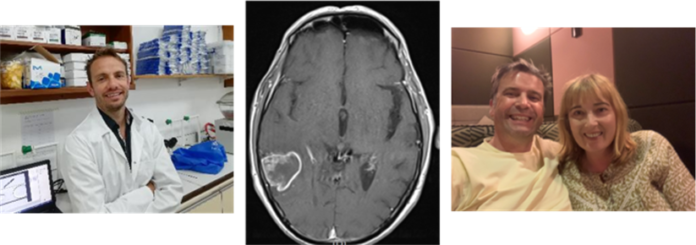
Scientists in Cardiff have been awarded a £500,000 grant to fund ground-breaking research which could bring much-needed hope to patients diagnosed with the most lethal form of brain cancer.
The funding has been awarded jointly between the charity Brain Tumour Research and the Medical Research Council (MRC). It will allow the development of a new ‘super sponge’ to deliver drugs directly to the brain following surgery.
The innovation focuses on glioblastoma (GBM) tumours, the most common type of primary malignant brain tumour in adults, which often carry a devastatingly short prognosis of just 12 to 18 months.
It is the charity’s first major investment in Wales and will see Dr Ben Newland leading a team at the School of Pharmacy and Pharmaceutical Sciences at the University of Cardiff. Also involved will be scientists from the Universities of Nottingham, Birmingham, Sheffield and King’s College London.
They will be developing a series of super sponges to be inserted into the space left behind following surgery to remove GBM tumours. The material will deliver combinations of repurposed cancer therapeutics that would not otherwise be able to pass the blood-brain barrier. This novel technique will reduce the side effects of cancer drugs and get effective treatments to the tumour cells left behind after surgery, which go on to cause recurrence of the disease.
Dr Newland said: “This project marks the start of our journey towards a paradigm shift in brain cancer treatment. By creating a new delivery system, we aim to tap into the multitude of existing drugs and unlock their potential to thwart brain tumours. Our team draws together a range of expertise, and we are very excited to undertake this challenge to improve the outcomes for brain tumour patients.”
News of this research has been welcomed by Julian Edwards, husband of Samantha Edwards who died from a GBM in December 2022. It’s after she suffered a seizure out-of-the-blue in October 2021. A scan found a mass on her brain and she was told it was unlikely she would survive more than two years.
Julian, who lives in Bridgend, said: “I would have given my right arm for Sam to have been diagnosed with a more manageable cancer with a better survival rate.
“Sam’s tumour was zapped and poisoned, but it grew for a second time and became harder to control. A second cycle of chemotherapy in October 2022 had little impact on the cancer. Sam just got more and more poorly.”
The mother-of-two had chemotherapy and radiotherapy treatment. However, the cancer grew too aggressive and she died 14 months after diagnosis.
Although this ‘super sponge’ innovation has come too late to help Samantha, Julian said: “I am relieved to see a potential positive outcome from the work facilitated by the Brain Tumour Research and the Medical Research Council funding partnership. The innovation demonstrated by Dr Newland’s approach gives hope to brain tumour patients and their families. I am encouraged and hopeful that the research community and oncology practitioners will be able to learn from this innovation to improve treatments for all types of brain tumours in the future.”
Dr Karen Noble, Director of Research, Policy and Innovation at Brain Tumour Research said: “We are delighted to be able to support the pioneering work of Dr Newland and his team. We share his excitement on undertaking this challenge, which is both our first funding of brain tumour research in Wales and our first such funding partnership with the MRC.
“Developing a way to deliver therapeutics intraoperatively presents a remarkable opportunity to progress care for brain tumour patients and potentially reduce the incidence of tumour recurrence.
“Brain tumour patients have waited too long for an improvement in treatment options, and we are very excited by this research into novel drug delivery as it is the route to improving the dreadful statistics associated with this devastating disease.”
Brain Tumour Research funds sustainable research at dedicated centres in the UK. It also campaigns for the Government and larger cancer charities to invest more in research into brain tumours in order to speed up new treatments for patients and, ultimately, to find a cure. The charity is the driving force behind the call for a national annual spend of £35 million in order to improve survival rates and patient outcomes in line with other cancers such as breast cancer and leukaemia.
Help keep news FREE for our readers
Supporting your local community newspaper/online news outlet is crucial now more than ever. If you believe in independent journalism, then consider making a valuable contribution by making a one-time or monthly donation. We operate in rural areas where providing unbiased news can be challenging. Read More About Supporting The West Wales Chronicle






















